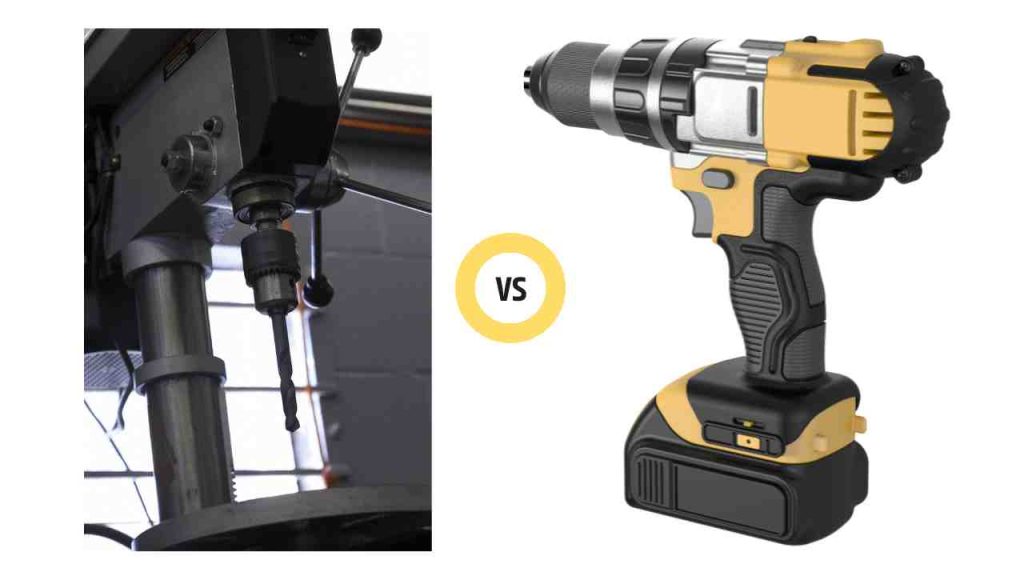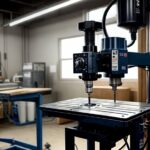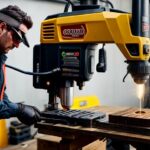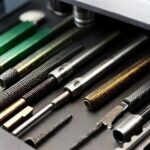A stationary equipment called a drill press makes holes in various materials, including plastic, metal, and wood. It is renowned for its accuracy, reliability, and safety features. On the other hand, a hand drill is a handheld instrument used for manually drilling holes into materials. It is convenient, affordable, and used everywhere.
To choose the right equipment for your tasks, you must know the differences and similarities between a drill press and a hand drill. That is the goal of this blog article. This page will provide a thorough overview of what to anticipate from each instrument and when to use it, whether you’re an experienced woodworker or just getting started. So let’s get started!
Comparison chart:
| Feature | Drill Press | Hand Drill |
| Precision | High | Low |
| Consistency | High | Low |
| Safety | High | Low |
| Cost | High | Low |
| Portability | Low | High |
| Complexity | High | Low |
| Ease of Use | Moderate | Easy |
| Physical Effort Required | Low | High |
| Suitable for Large Projects | Yes | No |
| Suitable for Small Projects | No | Yes |
5 major differences between drill press vs hand drill:
- Accuracy: Accuracy is one of the key distinctions between a drill press and a hand drill. A chuck that keeps the drill bit in position on a drill press makes it possible to provide precise and reliable results while drilling. A hand drill, on the other hand, might produce uneven or crooked holes since it depends on the user’s hand to guide the drill bit and maintain it level.
- Consistency: Another significant distinction between a drill press and a hand drill is consistency, which goes hand in hand with accuracy. Due to its fixed location and constant speed, a drill press is designed to provide reliable results every time. When using a hand drill, the user’s speed and pressure might change, producing erratic results.
- Safety: Safety is still another crucial aspect when deciding between a drill press and a hand drill. Safety measures on a drill press include a guard to shield the user’s hands and a switch to shut the machine off in an emergency. The risk of harm increases while using a hand drill since the user’s hands are exposed and the drill bit might become dangerous if it slips or jams.
- Price: Due to its more sophisticated features and expanded capabilities, a drill press often costs more than a hand drill. A hand drill is a more affordable solution for people who are just starting or rarely need to drill a few holes.
- Portability: A drill press and a hand drill have different levels of portability. A hand drill is a more practical solution for individuals who need to work on projects in various places since a drill press is a stationary instrument that must be set up in a permanent area.
Similarities:
- Usability: To drill holes into materials including wood, metal, plastic, and more, a drill press and a hand drill are utilized. The primary function of these tools is to make a hole in a substance.
- Drill Bit Compatibility: You may use the same drill bits with a drill press and a hand drill, making it simple to swap between the two when necessary.
- Adjustability: You can alter the depth of the hole and the drill bit size being used with a drill press and a hand drill thanks to adjustable features like a depth stop and a chuck.
- Versatility: Both tools have various uses, including drilling holes for electrical and plumbing work and dowels, screws, and other fasteners.
- Regular maintenance is necessary to maintain a drill press and a hand drill in excellent operating condition. This includes lubricating the moving parts, cleaning the surface, and replacing worn-out or broken components.
When Is a Drill Press Better Than a Hand Drill?
A drill press is the best tool for working on bigger, more precise tasks that call for exact and consistent holes. It is designed to provide precise and reliable results, making it perfect for tasks requiring high accuracy, like cabinet construction, woodturning, metalworking, and more. A drill press may also work with harder materials, such as metal and hardwoods, that would be difficult to drill by hand.
Hand drill for smaller, less important tasks: A hand drill is a fantastic alternative if you’re working on smaller, less important projects that don’t require high accuracy. It is the perfect tool for DIY tasks like installing shelves, drilling pilot holes, and more since it is lightweight, portable, and simple. A hand drill is also a suitable option if you’re working in confined places or difficult-to-reach locations where a drill press may not be practicable.
Frequently Asked Questions (FAQs)
1. Can I use a hand drill for tasks that require high precision?
While a hand drill can be used for various tasks, it is not the best choice for high-precision work. A drill press is more suitable for tasks that require high accuracy and consistency due to its fixed position and constant speed.
2. Can I use a drill press for drilling into metal materials?
Yes, a drill press can be used for drilling into metal materials. It is capable of handling harder materials, such as metal and hardwoods, which would be difficult to drill by hand.
3. Is it possible to use the same drill bits for both a drill press and a hand drill?
Yes, you can use the same drill bits with both a drill press and a hand drill, making it easy to switch between the two tools when necessary.
4. Can a hand drill be used in tight spaces or hard-to-reach areas?
A hand drill is an excellent choice for working in confined spaces or difficult-to-reach locations where a drill press may not be practical. Its portability and ease of use make it suitable for such tasks.
5. What are some safety precautions to consider when using a drill press or a hand drill?
When using a drill press or a hand drill, always wear eye protection, keep your work area clean and well-lit, and ensure that your drill bits are sharp and in good condition. Additionally, follow the manufacturer’s guidelines for proper use and maintenance of your specific tool.
6. How do I maintain a drill press or a hand drill?
Regular maintenance is necessary to keep a drill press and a hand drill in good working condition. This includes lubricating the moving parts, cleaning the surface, and replacing worn-out or broken components as needed.
7. Is a drill press suitable for beginners?
A drill press can be used by beginners, but it may require a learning curve to master its features and capabilities fully. It is essential to read the user manual and follow safety precautions when using a drill press for the first time.
Final Words:
This blog article covered the distinctions and similarities between a drill press and a hand drill. We discussed each tool’s benefits, drawbacks, and appropriate times to utilize it for your tasks.
The accuracy, consistency, and safety characteristics of a drill press, a fixed instrument, make it the perfect choice for bigger, more exact operations. On the other hand, a hand drill is a portable equipment that is straightforward, affordable, and simple to use, making it a fantastic option for smaller, less important work.
To assist you in choosing the right equipment for your tasks, this blog article has given you a thorough overview of the differences between a drill press and a hand drill. A drill press and a hand drill may be useful equipment in your workshop, regardless of how experienced or inexperienced you are with woodworking.

Ultimately, everything depends on your requirements and the tasks you’re working on. Choose the instrument that best meets your needs since each one has distinct advantages and disadvantages. Enjoy your drilling!
- Where are WEN drill presses made? - April 2, 2023
- Where are Rikon drill presses made? - April 1, 2023
- Where are Powermatic drill presses made? - April 1, 2023






